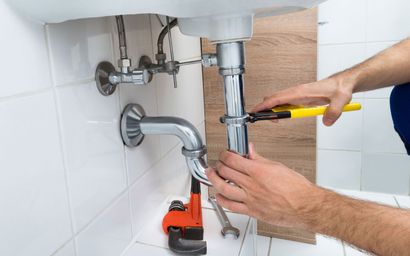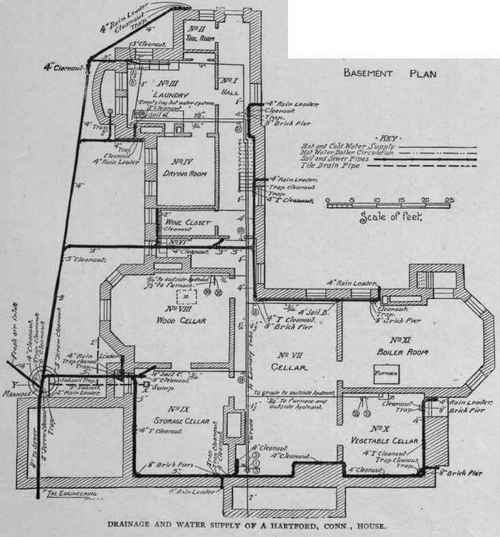The Layout of Your House's Plumbing System Explained
The Layout of Your House's Plumbing System Explained
Blog Article
On this page in the next paragraphs you can locate some outstanding expertise about The Inner Workings of Your Home's Plumbing.

Recognizing just how your home's pipes system works is important for every homeowner. From supplying clean water for drinking, cooking, and showering to safely eliminating wastewater, a well-maintained plumbing system is critical for your household's wellness and comfort. In this comprehensive guide, we'll discover the elaborate network that composes your home's plumbing and deal tips on upkeep, upgrades, and handling typical problems.
Intro
Your home's plumbing system is greater than just a network of pipes; it's an intricate system that ensures you have accessibility to tidy water and reliable wastewater removal. Recognizing its components and how they collaborate can aid you avoid pricey repairs and ensure whatever runs smoothly.
Standard Components of a Plumbing System
Pipelines and Tubes
At the heart of your pipes system are the pipes and tubing that lug water throughout your home. These can be made of different products such as copper, PVC, or PEX, each with its benefits in terms of sturdiness and cost-effectiveness.
Components: Sinks, Toilets, Showers, and so on.
Components like sinks, commodes, showers, and bathtubs are where water is utilized in your house. Recognizing how these components connect to the plumbing system assists in detecting troubles and planning upgrades.
Valves and Shut-off Factors
Shutoffs regulate the flow of water in your plumbing system. Shut-off shutoffs are important throughout emergency situations or when you require to make repair services, enabling you to separate parts of the system without interfering with water flow to the whole house.
Supply Of Water System
Key Water Line
The primary water line attaches your home to the metropolitan water or an exclusive well. It's where water enters your home and is dispersed to numerous components.
Water Meter and Pressure Regulator
The water meter measures your water use, while a stress regulator guarantees that water flows at a safe stress throughout your home's pipes system, stopping damage to pipelines and fixtures.
Cold Water vs. Warm water Lines
Recognizing the difference in between cold water lines, which provide water straight from the primary, and warm water lines, which bring warmed water from the water heater, assists in troubleshooting and planning for upgrades.
Drainage System
Drain Water Lines and Traps
Drain pipes carry wastewater away from sinks, showers, and commodes to the sewage system or septic tank. Traps avoid sewage system gases from entering your home and additionally catch particles that might trigger blockages.
Air flow Pipes
Air flow pipes allow air into the drain system, protecting against suction that can slow down drain and create catches to vacant. Correct air flow is important for preserving the integrity of your pipes system.
Value of Correct Drain
Guaranteeing proper drain avoids back-ups and water damage. Routinely cleaning up drains pipes and preserving traps can prevent pricey repair work and extend the life of your plumbing system.
Water Heating Unit
Types of Hot Water Heater
Hot water heater can be tankless or conventional tank-style. Tankless heating systems heat water as needed, while storage tanks save heated water for instant use.
Updating Your Pipes System
Factors for Upgrading
Updating to water-efficient fixtures or replacing old pipelines can enhance water quality, decrease water bills, and boost the worth of your home.
Modern Pipes Technologies and Their Benefits
Discover innovations like smart leakage detectors, water-saving toilets, and energy-efficient hot water heater that can save cash and reduce ecological impact.
Price Considerations and ROI
Compute the upfront prices versus lasting cost savings when thinking about plumbing upgrades. Several upgrades pay for themselves via decreased energy bills and less repair work.
Exactly How Water Heaters Connect to the Plumbing System
Recognizing how hot water heater attach to both the cold water supply and hot water distribution lines aids in identifying concerns like inadequate warm water or leaks.
Upkeep Tips for Water Heaters
Routinely flushing your water heater to get rid of debris, checking the temperature setups, and inspecting for leaks can expand its life-span and boost energy efficiency.
Typical Pipes Concerns
Leakages and Their Causes
Leakages can take place due to maturing pipelines, loose installations, or high water stress. Dealing with leakages without delay avoids water damage and mold growth.
Blockages and Clogs
Clogs in drains and bathrooms are typically brought on by purging non-flushable items or an accumulation of oil and hair. Utilizing drainpipe screens and being mindful of what decreases your drains can stop obstructions.
Indicators of Pipes Troubles to Watch For
Low tide stress, slow-moving drains, foul odors, or unusually high water expenses are indications of possible pipes troubles that should be addressed quickly.
Plumbing Maintenance Tips
Regular Inspections and Checks
Schedule yearly pipes inspections to capture concerns early. Seek indicators of leakages, deterioration, or mineral buildup in faucets and showerheads.
DIY Maintenance Tasks
Simple jobs like cleansing tap aerators, looking for commode leakages making use of dye tablet computers, or insulating subjected pipes in chilly climates can avoid major plumbing issues.
When to Call a Professional Plumber
Know when a plumbing problem requires specialist expertise. Attempting complex repair work without appropriate knowledge can cause even more damages and greater repair prices.
Tips for Lowering Water Use
Basic routines like repairing leaks promptly, taking much shorter showers, and running complete tons of washing and meals can save water and lower your energy costs.
Eco-Friendly Plumbing Options
Think about sustainable pipes products like bamboo for flooring, which is durable and eco-friendly, or recycled glass for countertops.
Emergency situation Preparedness
Actions to Take Throughout a Plumbing Emergency
Know where your shut-off shutoffs lie and just how to shut off the water supply in case of a ruptured pipe or major leakage.
Value of Having Emergency Calls Helpful
Keep call info for local plumbers or emergency situation services readily available for fast feedback during a pipes crisis.
Environmental Impact and Preservation
Water-Saving Fixtures and Devices
Setting up low-flow faucets, showerheads, and bathrooms can considerably lower water use without sacrificing efficiency.
DIY Emergency Situation Fixes (When Appropriate).
Short-lived repairs like making use of duct tape to spot a dripping pipe or placing a container under a trickling faucet can decrease damages until a specialist plumbing technician arrives.
Verdict.
Comprehending the anatomy of your home's plumbing system encourages you to preserve it effectively, conserving time and money on repair services. By following normal maintenance regimens and staying informed regarding modern pipes innovations, you can ensure your pipes system operates effectively for years ahead.
The Anatomy of Your Home s Plumbing System
Understanding the anatomy of your home s plumbing system is essential for any homeowner. It not only helps in identifying potential issues but also facilitates effective communication with professionals when repairs or upgrades are needed. Your home s plumbing system is more than just pipes and faucets; it s a complex network that ensures the efficient and hygienic flow of water in and out of your house. In this blog, we ll dissect the crucial components of your home s plumbing system. For those in Antelope Valley, Brock Plumbing is your trusted partner for all your plumbing needs, ensuring your system functions smoothly and efficiently.
Water Supply System
Main Water Line: This is where your home s plumbing system begins. The main water line connects your home to the public water supply or a private well. Pipes and Shut-off Valves: Pipes distribute water throughout your home. Shut-off valves are crucial for controlling the flow of water and making repairs without shutting off the entire system. Drainage System
Drain Pipes: These pipes carry waste and water away from sinks, toilets, and showers. Vents: Vents allow sewer gases to escape and help maintain proper pressure in the drainage pipes, ensuring efficient flow of wastewater. Traps: Every fixture has a trap, a U-shaped pipe that holds water and prevents sewer gases from entering your home. The most common is the P-trap under sinks. Fixtures and Appliances
Fixtures and appliances are the most interacted with parts of your plumbing system. They include sinks, toilets, showers, dishwashers, and washing machines. Each fixture and appliance has its own supply and drainage connection, ensuring they receive clean water and can dispose of wastewater effectively.
Water Heating System
Your water heater is a crucial component, providing hot water to various fixtures and appliances in your home. It can be tank-based or tankless, with each type having its own set of advantages and maintenance requirements. Regular maintenance is essential to ensure efficient operation and extend the lifespan of the unit.
Sump Pump
In areas prone to flooding or with high water tables, a sump pump is an essential part of the plumbing system. It s installed in the lowest part of your basement or crawlspace and pumps out water that accumulates, preventing flooding and protecting your home from water damage.
Septic System
Homes that are not connected to a municipal sewer system have a septic system and an underground wastewater treatment structure. Understanding how to maintain your septic system is crucial to prevent backups, odors, and early system failure.
Conclusion
Your home s plumbing system is a complex and essential network, ensuring the efficient and hygienic flow of water in and out of your property. Understanding its key components helps in maintaining it properly and identifying issues before they escalate into major problems. For residents in Antelope Valley, Brock Plumbing is dedicated to providing top-notch services, ensuring that every part of your plumbing system is in perfect working order. Trust our team of professionals to handle all your plumbing needs, ensuring your home remains comfortable, safe, and well-maintained.
https://brockplumbinganddrains.com/blog/the-anatomy-of-your-homes-plumbing-system/

I hope you enjoyed our section about Understanding Your Home's Plumbing Anatomy. Many thanks for taking the time to browse our blog. Enjoyed reading our article? Please quickly share it. Help other people discover it. Bless you for being here. Kindly check up our blog back soon.
Click Here To Read More Report this page